- Home
- Matt James
The Forgotten Fortune Page 2
The Forgotten Fortune Read online
Page 2
“Get ready,” he said, looking up.
As soon as his eyes found the bear’s, she roared. Jack had just become her rival. He had done it on purpose, however. Even though the female was smart, she wasn’t a person—and she wasn’t a person like Jack Reilly.
The pair of cubs responded and slunk away into the brush behind their mother. Slowly, Jack shouldered his rifle, but he kept his finger off the trigger.
Like a torpedo being shot out of a submarine, the bear dropped to all fours and charged, head down. She focused on her closest foe: Jack.
But he had an ace up his sleeve. He knew more about the bear than she did about him. Grizzlies were surprisingly agile creatures despite their imposing size. The species had a bite strong enough to crush a bowling ball too. Jack was more interested in this one’s body weight, though. That, combined with its impressive sprint speed, made the bear more of an out-of-control, toothy boulder than a light-footed ninja contortionist.
With only feet to go, Jack shouted, “Now!”
He dove left, and Bull dove to the right. The Grizzly frantically tried to change course but couldn’t, stumbling and going down. She barrel-rolled into, and through, a thicket of shrubs, disappearing from view. Instead of getting closer to the bear himself, he let the animal do all the work.
The pair quietly got to their feet and carefully listened. The rangers slung their rifles over their shoulders and drew their pepper spray pistols. They could hear the creature wrestling around in the entanglement, although she hadn’t yet emerged to re-engage. Shit. Jack would never forgive himself if she were hurt.
Slowly, he crept forward while Bull hung back.
There were only three feet between him and the brush. With a lightning-fast swipe, the Grizzly’s enormous paw lashed out through the thicket, knocking the pepper spray from Jack’s hand. One of her immense claws cut his wrist to boot. He swung his carbine up and around and ripped it aside as well. Then, the bear emerged.
And she was pissed.
Unarmed, Jack backed away slowly, quickly starting to panic. Looking over his shoulder, he saw that Bull had his rifle jammed firmly into his right shoulder. He stalled the man’s attempts at shooting the animal with a raised hand. Jack pleaded for more time to get out of this without either him or the Grizzly, getting hurt. Bull was also the last person that wanted to harm a living thing. He valued the existence of the Earth’s inhabitants more than most.
Jack had spent the better part of his adult life bumping off a sect of them. Nevertheless, his conscience was clear. He went to bed knowing that the people he X’d-out maintained despicable existences. He specialized in silencing people who took joy in harming others. Now, he was in the profession of preserving life. Everything in Yellowstone was the responsibility of park rangers like him. The animals, plants, rocks, and people within the United Nations Educational, Scientific, and Cultural Organization (UNESCO) World Heritage Site were under the protection of Jack’s employers, the National Parks Service (NPS).
On her back legs once more, the Grizzly pushed through brush, snarling like a demon. The rage on display was remarkable. Jack would’ve loved nothing better than to watch her from afar, but instead, he was right in the thick of it.
When she dropped to charge Jack again, he closed his eyes and waited for it to be over. Either he’d be killed, or he’d be gravely injured. Regardless, he was about to experience a Grizzly mauling up close.
Amazingly, it didn’t come.
Jack was startled when he and the bear were doused in pepper spray. The concoction instantly caused him and the animal to cough and gasp for air. He inadvertently took a deep breath to yelp and took in a small amount of the aerosolled brew. In doing so, he’d experienced first-hand what it was like to be on the other end of his pepper cannon.
The bear whined, whimpered, and fled, crying like a scolded puppy. Her cubs hurried along after her, skirting around Jack and the remaining spice-filled cloud. With his eyes clenched shut, Jack grabbed at his left side. Tilting his head skyward, he drew another piece of equipment, perhaps the most vital one he carried. He unscrewed the cap of his canteen and splashed his face a half-dozen times, clearing away the worst of the remnants.
Opening his eyes, he sighed and turned. Bull wasn’t pleased, but he didn’t voice his displeasure. His deep scowl said enough. Jack had just forced Bull to harm one of nature’s creations.
“My bad,” Jack said, scratching his head. “I pictured that going a lot better in my head.”
Finally, the corner of Bull’s mouth curled into a small smile. He rolled his eyes and holstered his spent pepper spray pistol, picking up Jack’s discarded carbine in the process. Through tear-filled eyes, Jack located his own pepper cannon eight feet to his right.
“You underestimate her might,” Bull said, his baritone voice rumbling like thunder.
“Who, mama bear?”
He shook his head. “No, the natural world. She is unpredictable and does not bow to man’s will so easily.”
Jack knew he was right. Even after working as a park ranger for the last four years, he still couldn’t get used to the fact that he wasn’t in control. This was nature. It wasn’t a well-coordinated military strike. Out here, humanity wasn’t in charge.
Mother Nature was.
Bull had been a great mentor to Jack thus far. He was an even better friend. He had once given Jack two handmade bracelets after he had learned about the soldier's past. They symbolized Bull’s admiration for men like him. Jack appreciated the gesture a lot. Not everyone understood why some people served. Even a handful of them had thought Jack was a moron for willingly putting himself in mortal danger.
Bull had never asked him why he fought against terror. All he had done was thank him for his service. A few months after receiving the gifts, it all made sense. It turned out that Bull’s late father had been a veteran.
The beautifully beaded bracelet on his left wrist symbolized “strength,” while the one around his right wrist represented “courage.” Jack happily put them on, and he’d yet to take them off since. If it were up to him, they’d never leave his body.
After washing his face off again, Jack and Bull got on their way. Mr. Osman was still missing, and they needed to confirm his whereabouts before sunset. If they didn’t, the chances of them finding him would be slim-to-none. The park was too vast. Rarely did someone stay in one place for too long. Usually, they’d ramble around until they became exhausted and dehydrated.
That’s where Jack was leaning.
The telltale chirp of Jack’s satellite phone interrupted their search. He slowed and removed it from the side pocket of his backpack. The number that appeared was that of their main office. Usually, it was the field man who’d be calling the office, not the other way around.
He answered. “This is Jack.”
“Hey, Jack, it’s Sally.” She wasn’t as bubbly as usual.
Sally Siling was the main cog in their team’s machine, mostly handling the dispatching duties. She also coordinated their efforts with local law enforcement. Sally was the bridge between the NPS and the rest of the world.
“Hey, Sal, what’s up?” Jack asked, concerned. “Everything good back at HQ?”
“Everything is fine here.” She sighed. “Jack, we just got a call.” Her voice was shaky. “Since you were in the field, we couldn't guarantee them how long it would take to reach you, so we took a message and—”
“Sal,” Jack interrupted. There was absolutely something wrong. “What’s going on?”
“I’m so sorry, Jack. It’s your grandmother...”
2
Auschwitz-Birkenau State Museum
Oswiecim, Poland
Agatha Reilly, born Agatha Catherine Strzempka, was a remarkable woman. The Polish schoolteacher, turned historian, adopted Jack when he was six, following her son and daughter-in-law’s deaths aboard a single prop airplane. Jack’s parents were taking an aerial tour of the Nazca Lines in Peru when they went down due to engine fai
lure.
Along with her husband, Philip Ernest Reilly, a World War II veteran of the British Army, Agatha raised Jack in a household chock-full of archaeological and military history. The Reillys immigrated to the States a few years after getting married. Philip had become a successful stock trader, and Agatha had taken a job with the Smithsonian. The pair eventually retired, comfortably, in their late fifties after Philip hit it big on a couple of investments.
Jack’s grandmother—his babcia—developed a love of history following her time as a prisoner in the most well-known Nazi concentration camp of all, Auschwitz. Hitler’s ruthless Gestapo had kicked in her family’s door when she was a teenager, arresting her and her parents for nothing more than being Jewish. It was the last time she ever saw her mom and dad.
Agatha was a determined and inquisitive woman from the very beginning. She questioned everything, a trait that most found unappealing in her day. It wasn’t until she met a British soldier, named Philip, following the liberation of Auschwitz that Agatha found love. The pair later found out that they may have met once before, though, unlikely. Philip had been there that day—the day Agatha and thousands of other prisoners had been liberated from their terrible bondage. It was the day Auschwitz was shut down for good by the Allied Forces.
That was a great day.
Jack owed everything he was to his grandparents. They happily took him in and raised him as their son, not just their paternal grandson. Jack’s father, Phil Jr., a freelance photographer, had sold his work to major news outlets and magazines, globally. He and Jack’s mother, Stephanie, were combining a work trip to Peru with their tenth anniversary when they tragically perished.
Jack blinked his eyes, pulling back the tears that threatened to fall. He remembered the phone call as if it were yesterday.
His grandmother answered the phone like it was any other day. He often stayed with them, something he gladly did whenever his mom and dad traveled. He loved staying in his grandparent’s home. It was filled wall-to-wall with historical finds—a miniature museum that any young lover of history would enjoy. Jack grew up wanting to be exactly like Philip and Agatha.
He loved the stories his grandfather told him about the days when he served.
A young, wide-eyed Jack would sit and listen to his grandmother go on and on about the places she traveled to and the things she saw. Agatha never got enough of Jack’s questions, even after she retired.
Regrettably, he was only able to study under his grandfather for another decade. Philip passed away when Jack was still in high school. It was his death that spurred Jack to enlist in the United States Army. He wanted to honor the man’s legacy, a man that fought valiantly against the worst of the worst, the Nazis.
Philip had heroically stormed Normandy Beach and then went on to help liberate Auschwitz. He was a war hero, but he had never looked for a pat on the back. Jack’s service with Delta was very much the same. They didn’t look for recognition, or fame and fortune. Soldiers didn’t need the public spotlight to be prideful in what they did. Jack and the other operators did the job because a job needed to get done. Period.
The cold breeze snapped Jack out of it. It was nearly winter in Poland. The temperatures were already in the thirties, and a light snow dusting was present from time to time. Their young guide, Kasper, had given Jack and two dozen other patrons a haunting walking tour of the main camp. He’d learned so much about what the prisoners had gone through while confined here.
What Grandma went through, he thought, picturing a teenaged Agatha Strzempka marching in line to the Women’s Barracks.
There were also the Prisoner Reception Center, the crematoriums, the communal latrines, and of course, the gas chambers. It was all awful, but it was essential for people to learn about so they could avoid a repeat offense.
Jack broke away from the tour early to meander in peace. He weaved in and out of other tour groups and took in as much as he could. Most of the centralized red brick buildings were once used as barracks for the Polish Army before the complex was overtaken and transitioned into the main camp and administrative headquarters for Hitler’s people.
Electrified barbed wire fencing, the same fences used during the war, were still present. Just their presence made Jack uncomfortable—as did the brisk breeze slapping his face. Luckily, the sun was out. He tilted his head up and caught a few of its rays.
“Enjoying yourself?”
Jack opened his eyes and turned around.
A beautiful woman with shoulder-length blonde hair was watching him. Her eyes were a crystal blue, amazing to look at, and based on her accent, she was a Brit, though her accent hinted at some other European influence. Jack grew up with a British grandfather. He was very accustomed to its nuances.
They were alone at the barbed wire fence. Everyone else had moved on to find something more interesting than a rusty, wire fence.
Jack shrugged. “Considering where we are, yeah.”
“You don’t like this place?” she asked, adjusting the wool beanie on her head.
“No, do you?”
She nodded. “Yes, but only because I’m writing a paper on it.”
That made more sense to Jack than just loving the concentration camp because of what it was. She was clearly a student, though, she looked a little old to be in college.
Early thirties, maybe?
“Thesis?” he asked, honestly interested.
“Yes, I’ve been studying this place from afar for over a year.” She looked around. “I’d be lying if I said that I wasn’t excited to finally be here. My family was involved in the war, like most. I needed to see this place with my own eyes.”
“What school do you go to?”
“The University of Bonn in Germany. After a career change, I decided to move and study what I’ve always been fond of, the history of the Second World War.” She laughed. “Better late than never, I suppose.”
Jack knew what she meant.
“I can relate.”
“Oh?” she asked.
He nodded. “I’m a park ranger in Yellowstone. Before that, I was in the military.”
“Afghanistan?”
He wiggled his hand. “A little. I was mostly in Iraq.”
“And Auschwitz interests you because…?”
“Um, well, you see, my grandma was a prisoner here towards the end of the war. She passed away last month, and I thought this would be a great way to remember her.”
The blonde smiled. “I gather you were close.”
“We were,” Jack replied. “My grandparents raised me. Grandma was a pretty well-known historian with the Smithsonian back in the States. Everything I am is because of her and my grandpa.”
She stepped up to him and held out her hand. “Emma Schmidt.”
He clasped it. She had a firm handshake. “Jack Reilly.”
“It was nice to meet you, Jack.”
“Likewise.”
She turned but swiftly stopped. “Maybe, if we bump into one another again, we can get a cup of coffee?”
He shivered and nodded. “Yeah, I’d like that.”
Jack hadn’t come to Poland to meet new people, including beautiful blonde Brits. Yet, here he was, in Auschwitz, doing precisely that. He didn’t let it consume him, though. The chances of him ever seeing Emma again were slim to none. In a week, he’d be back in Wyoming, searching for another lost tourist.
He and Bull did eventually locate Mr. Osman. He was perfectly fine too. The story goes that Mr. Osman bolted from his house one night, panicked and scared…after his wife learned of his workplace affair with his secretary. He’d been hiding out in the park too terrified to go home to his, understandably, irate spouse. She reported him missing after not coming home for a second night. Jack had almost been torn to shreds by a Grizzly for nothing.
As soon as Jack turned his attention back to the fence, and off of Emma’s tight butt, he heard the last thing he ever thought he’d hear. Gunfire. The screams of museum visitors quickly fo
llowed, as did the echoing report of additional gunshots.
Multiple shooters, he deduced. Same caliber rifle too.
Jack wasn’t sure if there was anyone around to fight back. He recalled seeing a small security presence on the grounds, but nothing to write home about. He’d seen three men stationed around the camp so far. None carried anything harder hitting than a nightstick and a stun gun.
Seriously, who’d want to attack a museum?
“Jack?” Emma shouted, confused. She also sounded scared.
He rushed to Emma’s side and grabbed her by the back of her arm. Quickly, he half-dragged her out of the open and into a tight alleyway separating a row of brick barracks. More screams arose. In response, Jack moved faster, finding the nearest accessible building he could: Crematorium I.
Previously used by the Polish Army as a munitions bunker, the brick and concrete building was responsible for thousands upon thousands of deaths. It was incredibly eerie that he and Emma were seeking shelter there now.
So far, the Brit was holding it together pretty well. He needed to keep her that way for as long as possible. He wouldn’t be able to protect her effectively if she turned into a blubbering mess.
“Okay,” he said, entering the first room on the right, “this is what’s going to happen... We’re going to hole up here for as long as we can. If we have to leave, then we’ll do so quickly and quietly. You,” he squeezed her arm tighter, making sure he had her full, undivided attention, “will do everything I say, okay?”
Emma silently nodded, eyes wide.
“Wh…what did you say you did in the military?”
He shook his head, peeking through a shoulder-height window. “I didn’t say, but if it makes you feel better, know that I handled people like this all the time.”
“What people exactly?”

 Interface
Interface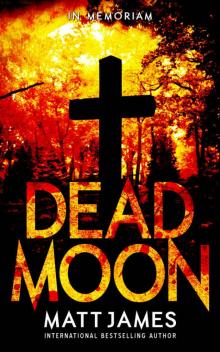 In Memoriam
In Memoriam Broken Glass
Broken Glass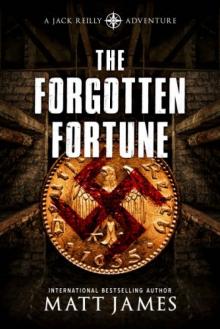 The Forgotten Fortune
The Forgotten Fortune DEAD MOON Box Set: Post-Apocalyptic Survival Series (Books 1-3)
DEAD MOON Box Set: Post-Apocalyptic Survival Series (Books 1-3)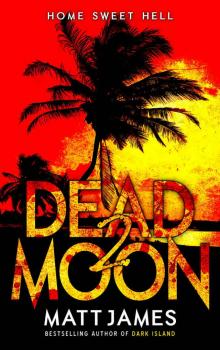 Dead Moon 2: Home Sweet Hell (Dead Moon Post-Apocalyptic Survival Thrillers)
Dead Moon 2: Home Sweet Hell (Dead Moon Post-Apocalyptic Survival Thrillers)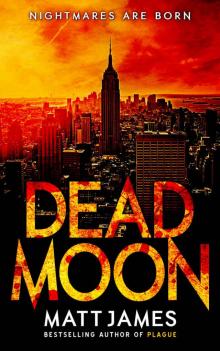 Dead Moon: Nightmares are Born (Dead Moon Post-Apocalyptic Survival Thrillers Book 1)
Dead Moon: Nightmares are Born (Dead Moon Post-Apocalyptic Survival Thrillers Book 1)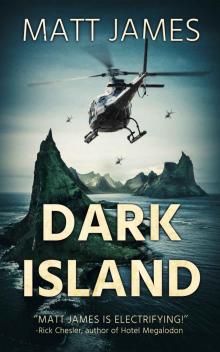 Dark Island
Dark Island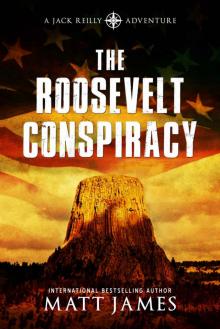 THE ROOSEVELT CONSPIRACY
THE ROOSEVELT CONSPIRACY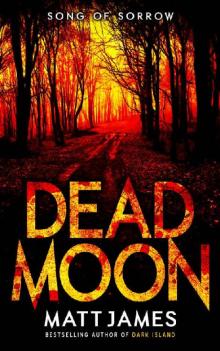 Dead Moon: Song of Sorrow (The Dead Moon Thrillers Book 3)
Dead Moon: Song of Sorrow (The Dead Moon Thrillers Book 3) Plague
Plague